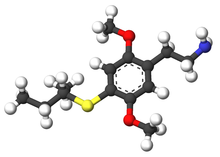
| |

| |
| Names | |
|---|---|
| Preferred IUPAC name
2-{4-[(Butan-2-yl)sulfanyl]-2,5-dimethoxyphenyl}ethan-1-amine | |
| Identifiers | |
3D model (JSmol)
|
|
| ChEMBL | |
| ChemSpider | |
PubChem CID
|
|
| UNII | |
CompTox Dashboard (EPA)
|
|
| |
| |
| Properties | |
| C14H21NO2S | |
| Molar mass | 269.40 g/mol |
Except where otherwise noted, data are given for materials in their standard state (at 25 °C [77 °F], 100 kPa).
| |
2C-T-17 or 2,5-dimethoxy-4-(β-secbutylthio)phenethylamine is a psychedelic phenethylamine of the 2C family. It was presumably first synthesized by Alexander Shulgin and reported in his book PiHKAL (Phenethylamines i Have Known And Loved).
Chemistry
2C-T-17 is the 2 carbon homologue of Aleph-17, which has never been synthesized. The full chemical name is 2-[4-(2-butyl thio)-2,5-dimethoxy phenyl]ethanamine. The drug has structural properties similar to drugs in the 2C-T series, with the most closely related compounds being 2C-T-7 and 2C-T-8.
General information
The dosage range of 2C-T-17 is typically 60-100 mg and its duration is approximately 10–15 hours according to Shulgin. 2C-T-17 has highly psychedelic effects on thinking, but produces few to no visuals.[1]
Pharmacology
The mechanism that produces 2C-T-17's hallucinogenic and entheogenic effects has not been specifically established, however it is most likely to result from action as a 5-HT2A serotonin receptor agonist in the brain, a mechanism of action shared by all of the hallucinogenic tryptamines and phenethylamines for which the mechanism of action is known.
Dangers
The toxicity of 2C-T-17 is not well documented. 2C-T-17 is much less potent than 2C-T-7, but it may be expected that at very high doses it would display similar toxicity to that of other phenethylamines of the 2C-T family.
Legality
2C-T-17 is not illegal, but possession and sales of 2C-T-17 could be prosecuted under the Federal Analog Act because of its structural similarities to 2C-T-7.
Canada
As of October 31, 2016, 2C-T-17 is a controlled substance (Schedule III) in Canada.[2]
United Kingdom
This substance is a Class A drug in the Drugs controlled by the UK Misuse of Drugs Act.[3]
References
- ^ Shulgin, Alexander; Shulgin, Ann (September 1991). PiHKAL: A Chemical Love Story. Berkeley, California: Transform Press. ISBN 0-9630096-0-5. OCLC 25627628.
- ^ "Canada Gazette – Regulations Amending the Food and Drug Regulations (Part J — 2C-phenethylamines)". 4 May 2016.
- ^ "UK Misuse of Drugs act 2001 Amendment summary". Isomer Design. Retrieved 12 March 2014.
